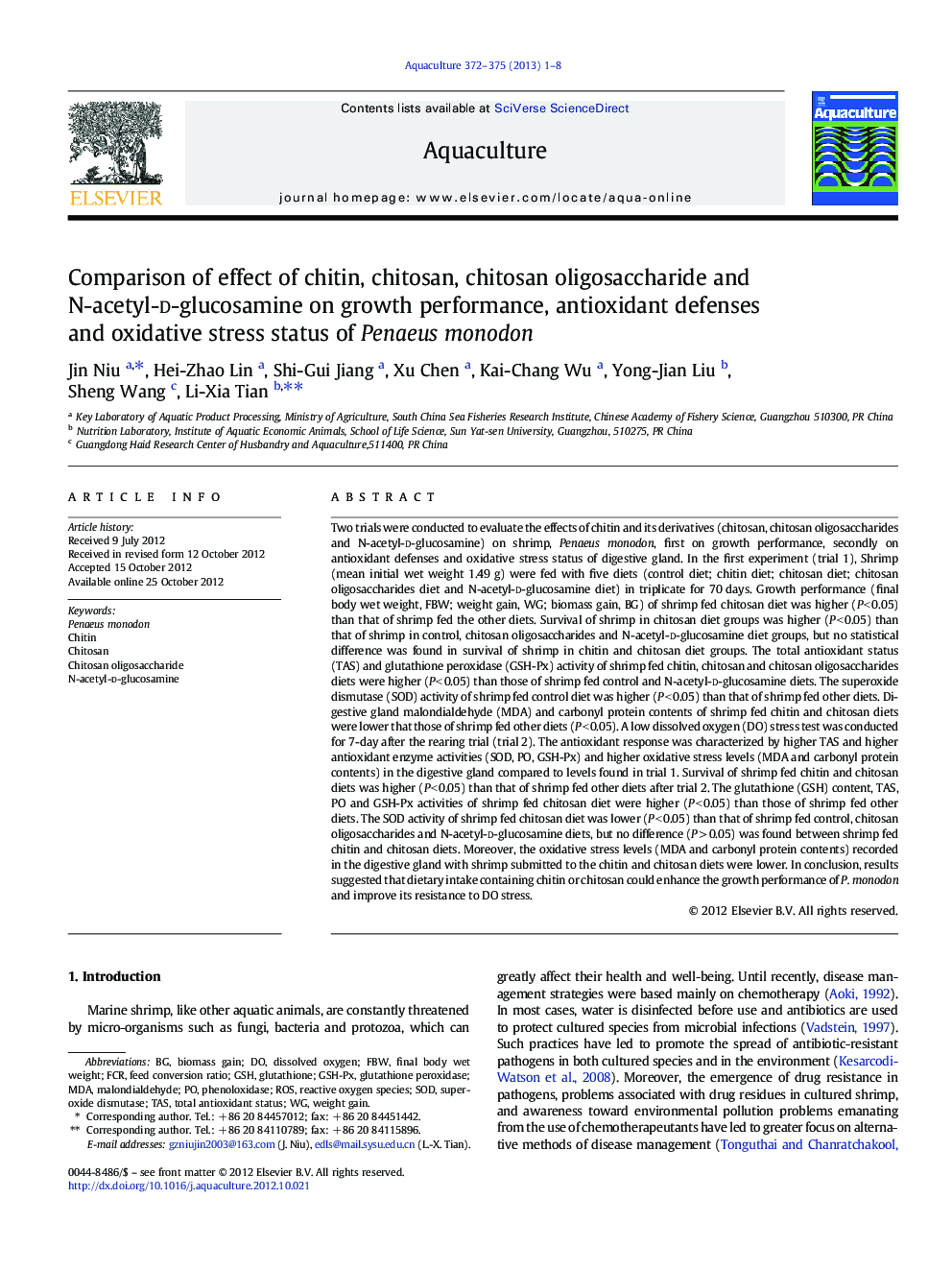| کد مقاله | کد نشریه | سال انتشار | مقاله انگلیسی | نسخه تمام متن |
|---|---|---|---|---|
| 2422278 | 1552880 | 2013 | 8 صفحه PDF | دانلود رایگان |

Two trials were conducted to evaluate the effects of chitin and its derivatives (chitosan, chitosan oligosaccharides and N-acetyl-d-glucosamine) on shrimp, Penaeus monodon, first on growth performance, secondly on antioxidant defenses and oxidative stress status of digestive gland. In the first experiment (trial 1), Shrimp (mean initial wet weight 1.49 g) were fed with five diets (control diet; chitin diet; chitosan diet; chitosan oligosaccharides diet and N-acetyl-d-glucosamine diet) in triplicate for 70 days. Growth performance (final body wet weight, FBW; weight gain, WG; biomass gain, BG) of shrimp fed chitosan diet was higher (P < 0.05) than that of shrimp fed the other diets. Survival of shrimp in chitosan diet groups was higher (P < 0.05) than that of shrimp in control, chitosan oligosaccharides and N-acetyl-d-glucosamine diet groups, but no statistical difference was found in survival of shrimp in chitin and chitosan diet groups. The total antioxidant status (TAS) and glutathione peroxidase (GSH-Px) activity of shrimp fed chitin, chitosan and chitosan oligosaccharides diets were higher (P < 0.05) than those of shrimp fed control and N-acetyl-d-glucosamine diets. The superoxide dismutase (SOD) activity of shrimp fed control diet was higher (P < 0.05) than that of shrimp fed other diets. Digestive gland malondialdehyde (MDA) and carbonyl protein contents of shrimp fed chitin and chitosan diets were lower that those of shrimp fed other diets (P < 0.05). A low dissolved oxygen (DO) stress test was conducted for 7-day after the rearing trial (trial 2). The antioxidant response was characterized by higher TAS and higher antioxidant enzyme activities (SOD, PO, GSH-Px) and higher oxidative stress levels (MDA and carbonyl protein contents) in the digestive gland compared to levels found in trial 1. Survival of shrimp fed chitin and chitosan diets was higher (P < 0.05) than that of shrimp fed other diets after trial 2. The glutathione (GSH) content, TAS, PO and GSH-Px activities of shrimp fed chitosan diet were higher (P < 0.05) than those of shrimp fed other diets. The SOD activity of shrimp fed chitosan diet was lower (P < 0.05) than that of shrimp fed control, chitosan oligosaccharides and N-acetyl-d-glucosamine diets, but no difference (P > 0.05) was found between shrimp fed chitin and chitosan diets. Moreover, the oxidative stress levels (MDA and carbonyl protein contents) recorded in the digestive gland with shrimp submitted to the chitin and chitosan diets were lower. In conclusion, results suggested that dietary intake containing chitin or chitosan could enhance the growth performance of P. monodon and improve its resistance to DO stress.
► Chitosan was superior to chitin or chitosan oligosaccharides as an immunostimulant.
► Chitosan could increase the antioxidant defense capability of shrimp.
► Chitosan could decrease the malondialdehyde level of digestive gland of shrimp.
► Chitosan could decrease the carbonyl protein level of digestive gland of shrimp.
► N-acetyl-d-glucosamine is not applicable in the feed of Penaeus monodon.
Journal: Aquaculture - Volumes 372–375, 24 January 2013, Pages 1–8